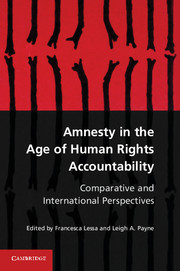Introduction
Published online by Cambridge University Press: 05 June 2012
Summary
Is amnesty an appropriate response to past human rights atrocities? Scholars and practitioners promoting transitional justice around the world have argued, in general, that it is not. They contend that legal, moral, and political duties compel governments emerging from authoritarian rule to hold perpetrators of human rights violence accountable. Beginning with the post-World War II Nuremberg and Tokyo Trials and continuing with the creation of the ICC, the international human rights system has attempted to replace the traditional practice of amnesty with a new norm of accountability for human rights violations. International conventions – adopted in the second half of the twentieth century – now obligate state parties to provide redress for victims of torture and genocide. The UN international criminal tribunals for the former Yugoslavia and Rwanda, set up in the early 1990s, underscore the international duty to hold perpetrators accountable. The notion of universal jurisdiction, and its use in the effort to extradite former Chilean dictator General Augusto Pinochet from the United Kingdom to stand trial in Spain in the late 1990s, claims that courts in one country can hold foreign perpetrators accountable for crimes against humanity committed in another country.
An accountability norm has spread throughout the world, producing dramatic and unprecedented results. Although General Pinochet did not stand trial in Spain, he did face charges in his own country before he died. Other heads of state responsible for human rights abuses have also faced trials, convictions, and prison sentences in Latin America, including former Peruvian and Uruguayan presidents Alberto Fujimori and Juan María Bordaberry. In December 2011, former military dictator Manuel Noriega was extradited from France to his native Panama to serve his prison sentence for human rights violations for which he had already been convicted in absentia. No region of the world has been exempt from accountability efforts. In Europe, one landmark case is the UN International Criminal Tribunal for the Former Yugoslavia efforts to convict former President Slobodan Milošević for grave human rights violations, including genocide, torture, and extermination committed in Bosnia and Herzegovina, Croatia, and Kosovo; Milošević died in 2006 while the trial was still ongoing. In Africa, former Liberian President Charles Taylor faces prosecution before the Special Court for Sierra Leone for eleven counts of war crimes, crimes against humanity, and other serious violations of international humanitarian law perpetrated in Sierra Leone.
- Type
- Chapter
- Information
- Amnesty in the Age of Human Rights AccountabilityComparative and International Perspectives, pp. 1 - 16Publisher: Cambridge University PressPrint publication year: 2012
References
- 2
- Cited by

